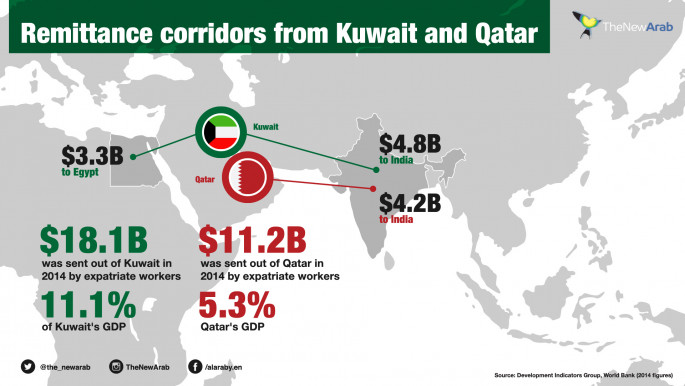Foreign beggars in Kuwait to face deportation without trial
Foreign beggars in Kuwait to face deportation without trial
Kuwait has rolled out tough new laws against suspects arrested for begging during the month of Ramadan, including deportation, a Gulf ban, and punishments for their Kuwaiti sponsors.
3 min read
Ramadan usually sees a spike in begging in Gulf states [AFP]
Expatriates caught begging in Kuwait this Ramadan face immediate deportation and a ban from re-entering the Gulf region.
The tough new measures were announced this week by the interior ministry who said police are working with ministry of Islamic affairs officials to nab suspected beggars.
The Ministry of Interior said it was also launching a public awareness campaign to encourage people to turn in any beggars to the police or via an emergency hotline.
Suspected beggars arrested this week were also named and shamed in an interior ministry statement, Gulf News reported.
There was no mention whether those allegedly caught begging will be able to put their case in court.
Mass arrests
It comes as dozens of people were arrested for begging in the Gulf State this week.
Most of those caught had Kuwaiti sponsors and authorities said they would ban these people from acting as guarantors for other expatriates in the future.
Authorities believe that organised begging rackets are at work with locals sponsoring beggars in return for money.
Others believe that low paid workers are forced into begging, to pay off loans or just to eat.
Human rights groups have complained that expatriate workers in the Gulf often don't receive their salaries or receive far less than what was promised by recruiters.
 |
A sign that the ministry are rattled by the recent spike in begging is the names, photos and nationalities of the accused were published in a interior ministry statement, Gulf News reported.
Identities of suspects are usually protected in Gulf States, including convicted felons with newspaper usually just revealing their initials and continent of origin.
Holy month
Kuwait's tough new measures were announced at the start of Ramadan - a holy month of fasting, charity and prayer for Muslims.
Ramadan is also a time Gulf States see a spike in begging, when Muslims are encouraged to help those less fortunate.
Charity is one of the five pillars of Islam, and sayings and accounts of the Prophet Muhammed emphasise the importance of sharing one's wealth with the poor.
Stories abound - whether true or not - of people flying in from neighbouring states to beg during Ramadan, and return home with handsome savings.
One beggar was nabbed by Kuwaiti police last year with an alleged $1.7 million fortune found in his bank account.
Despite Gulf States taking a very public approach to their overseas and domestic development work, most take a zero-tolerance attitude to begging.
Oman and the UAE are among the countries to have an anti-begging hotline.
A sensitive issue for the authorities is that many beggars have been caught pretending to be nationals. In the authorities' eyes tarnishes the image of the nation and sullying the name of nationals.
Poverty and begging is said to occur among Gulf nationals, but the issue is a sensitive one as it reflects an unfair disparity in wealth in GCC countries.
Media reports of families living in overcrowded, dilapidated housing do surface on occasion with "private donors" usually stepping in to provide funds for housing, jobs and money to the subjects.
But out-and-out begging is charity too far and forbidden.


